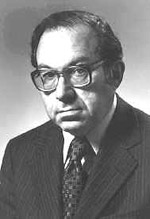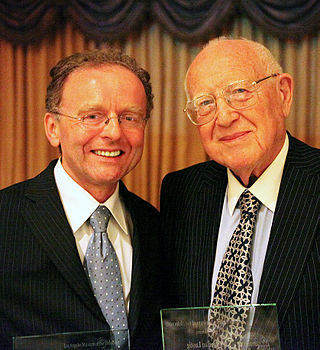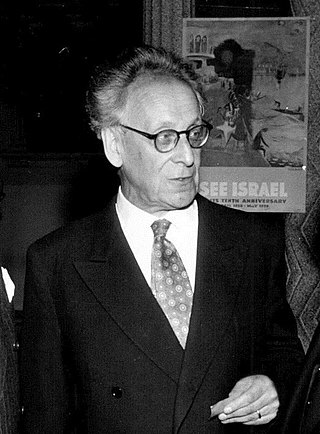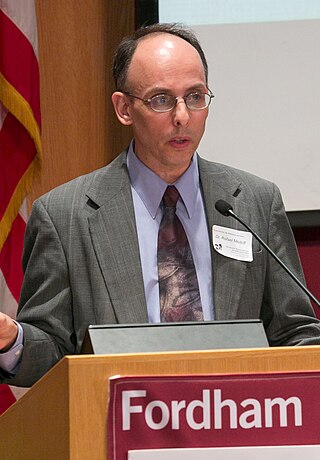
Holocaust denial is an antisemitic conspiracy theory that asserts that the Nazi genocide of Jews, known as the Holocaust, is a myth, fabrication, or exaggeration. Holocaust denial involves making one or more of the following false statements:

The United States Holocaust Memorial Museum (USHMM) is the United States' official memorial to the Holocaust. Adjacent to the National Mall in Washington, D.C., the USHMM provides for the documentation, study, and interpretation of Holocaust history. It is dedicated to helping leaders and citizens of the world confront hatred, prevent genocide, promote human dignity, and strengthen democracy.

Raul Hilberg was a Jewish Austrian-born American political scientist and historian. He was widely considered to be the preeminent scholar on the Holocaust. Christopher R. Browning has called him the founding father of Holocaust Studies and his three-volume, 1,273-page magnum opus, The Destruction of the European Jews, is regarded as seminal for research into the Nazi Final Solution.
David Cesarani was a British historian who specialised in Jewish history, especially the Holocaust. He also wrote several biographies, including Arthur Koestler: The Homeless Mind (1998).

Gedenkdienst is the concept of facing and taking responsibility for the darkest chapters of one's own country's history while ideally being financially supported by one's own country's government to do so. Founded in Austria in 1992 by Andreas Maislinger, the Gedenkdienst is an alternative to Austria's compulsory national military service as well as a volunteering platform for Austrians to work in Holocaust and Jewish culture-related institutions around the world with governmental financial support. In Austria it is also referred to as Austrian Holocaust Memorial Service provided by the Austrian Service Abroad. The Austrian Gedenkdienst serves the remembrance of the crimes of Nazism, commemorates its victims and supports Jewish cultural future. The program is rooted in the acknowledgment of responsibility by the Austrian government for the crimes committed by National Socialism.

The Austrian Service Abroad is a non-profit organization founded by Andreas Hörtnagl, Andreas Maislinger and Michael Prochazka in 1998, which sends young Austrians to work in partner institutions worldwide serving Holocaust commemoration in form of the Gedenkdienst, supporting vulnerable social groups and sustainability initiatives in form of the Austrian Social Service and realizing projects of peace within the framework of the Austrian Peace Service. Its services aim at the permanence of life on earth. The Austrian Service Abroad carries and promotes the idea of the House of Responsibility for the birthplace of Adolf Hitler in Braunau am Inn. The Austrian Service Abroad is the issuer of the annually conferred Austrian Holocaust Memorial Award. The program is funded by the Austrian government.


Hugo Valentin (1888–1963) was a Swedish historian, scholar and leading Zionist. He received his PhD from Uppsala University in 1916 and took up teaching at the Teachers Training College in Uppsala and at a high school. In 1930 he was appointed lecturer at the high school in Uppsala. In 1930 he was also awarded the title of Docent by the university, and, some years later, in 1948, the government awarded him the honorary title of professor.

A bilateral relationship exists between Armenia and Israel. From 1993 to 2007, Armenia was served by the Embassy of Israel in Georgia. In 1996, Tsolak Momjian was appointed the honorary consul of Armenia in Jerusalem. Eleven years later, the residence of the Embassy of Israel in Armenia was moved to Jerusalem. In October 2010, Shmuel Meirom was appointed the Israeli ambassador to Armenia. Armen Melkonian was appointed the Armenian ambassador to Israel in 2012, with a residence in Cairo. In October of that year, Melkonian presented his credentials to Israeli President Shimon Peres. On 21 September 2019 Armenia announced that it would be opening an embassy in Israel. Despite generally cordial ties between the two, relations soured after Armenia withdrew its ambassador to Israel due to Israeli arms supply to Armenia's enemy, Azerbaijan, in the 2020 Nagorno-Karabakh War.
Gunnar Svante Paulsson is a Swedish-born Canadian historian, university lecturer, and author who has taught in Britain, Canada, Germany, and Italy. He specializes in history of The Holocaust and has been described as "an expert on that period". He is best known for his 2002 book, Secret City: The Hidden Jews of Warsaw 1940-1945.
Paul R. Bartrop is an Australian historian of the Holocaust and genocide. From August 2012 until December 2020 he was Professor of History and Director of the Center for Judaic, Holocaust and Genocide Studies at Florida Gulf Coast University, Fort Myers, Florida. Between 2020 and 2021 he was an honorary Visiting Professorial Fellow at the University of New South Wales, Canberra. In April 2021 he became Professor Emeritus of History at Florida Gulf Coast University, and in 2022 he became an honorary Principal Fellow in History at the University of Melbourne. During the academic year of 2011-2012 he was the Ida E. King Distinguished Visiting Professor of Holocaust and Genocide Studies at Richard Stockton College of New Jersey.

Rafael Medoff (born c. 1959) is an American professor of Jewish history and the founding director of The David Wyman Institute for Holocaust Studies, which is based in Washington, D.C. and focuses on issues related to America's response to the Holocaust.
Holocaust studies, or sometimes Holocaust research, is a scholarly discipline that encompasses the historical research and study of the Holocaust. Institutions dedicated to Holocaust research investigate the multidisciplinary and interdisciplinary aspects of Holocaust methodology, demography, sociology, and psychology. It also covers the study of Nazi Germany, World War II, Jewish history, religion, Christian-Jewish relations, Holocaust theology, ethics, social responsibility, and genocide on a global scale. Exploring trauma, memories, and testimonies of the experiences of Holocaust survivors, human rights, international relations, Jewish life, Judaism, and Jewish identity in the post-Holocaust world are also covered in this type of research.
USC Shoah Foundation – The Institute for Visual History and Education, formerly Survivors of the Shoah Visual History Foundation, is a nonprofit organization dedicated to making audio-visual interviews with survivors and witnesses of the Holocaust and other genocides, a compelling voice for education and action. It was established by Steven Spielberg in 1994, one year after completing his Academy Award-winning film Schindler's List. In January 2006, the foundation partnered with and relocated to the University of Southern California (USC) and was renamed the USC Shoah Foundation – The Institute for Visual History and Education. In March 2019, the institute opened their new global headquarters on USC's campus.
The assertion that the Holocaust was a unique event in human history was important to the historiography of the Holocaust, but it has come under increasing criticism in the twenty-first century. Related claims include the claim that the Holocaust is external to history, beyond human understanding, a civilizational rupture, and something that should not be compared to other historical events. Uniqueness approaches to the Holocaust also coincide with the view that antisemitism is not another form of racism and prejudice but is eternal and teleologically culminates in the Holocaust, a frame that is preferred by proponents of Zionist narratives.
Aubrey N. Newman is a British historian who has written widely on the topic of Anglo-Jewish history. Newman served as a professor at the University of Leicester, where he founded the Stanley Burton Centre for Holocaust Studies. He served two terms as President of the Jewish Historical Society of England.
Genocide education refers to education about patterns and trends in the phenomenon of genocide and/or about the causes, nature and impact of particular instances of genocide.

Holocaust education is efforts, in either formal or informal settings, to teach about the Holocaust. Teaching and Learning about the Holocaust addresses didactics and learning, under the larger umbrella of education about the Holocaust, which also comprises curricula and textbooks studies. The expression "Teaching and Learning about the Holocaust" is used by the International Holocaust Remembrance Alliance.
The International Conference on the Holocaust and Genocide was the first major conference in the field of genocide studies, held in Tel Aviv on 20–24 June 1982. It was organized by Israel Charny, Elie Wiesel, Shamai Davidson, and their Institute on the Holocaust and Genocide, founded in 1979. The conference's objective was to further the understanding and prevention of all genocides; it marked the shift from viewing genocide as an irrational phenomenon to one that could be studied and understood.
Alexander Martin Korb is a German historian specialising in the Holocaust, Genocide, anti-Semitism and related mass crimes in Central and Eastern Europe. Since 2010 Korb has been Lecturer in Modern European History at the University of Leicester. From 2012 until 2018 he was director of the Stanley Burton Centre for Holocaust Studies.










